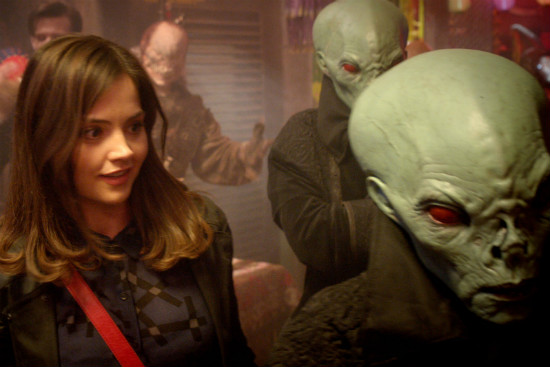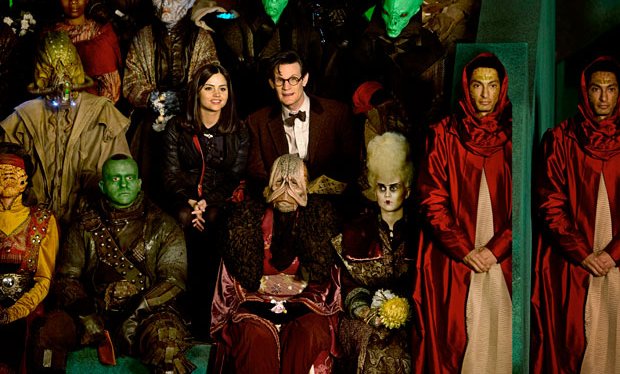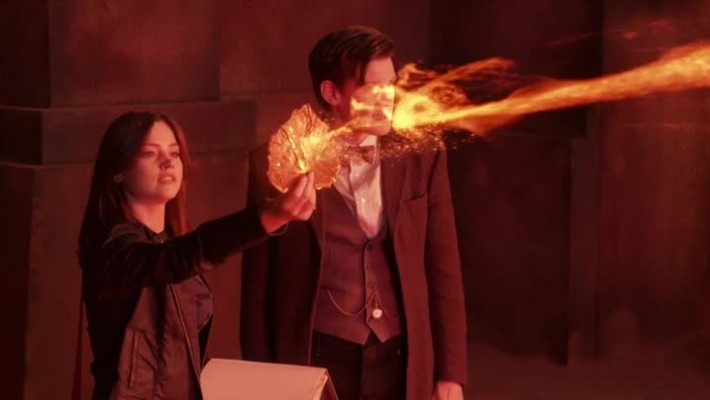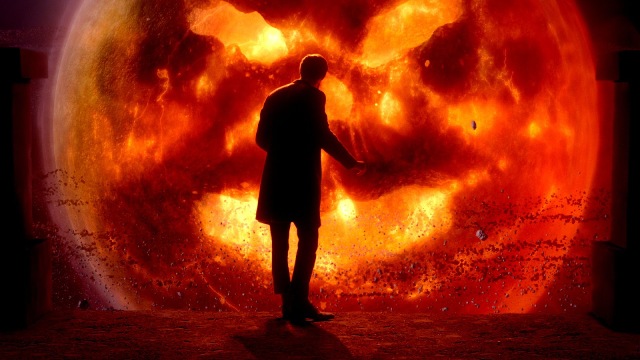A little later than scheduled, our reviewer James Willets is here to pick over the bones of one of New Who’s most divisive episodes in ages.
There was a point about halfway through ‘Rings’ when I thought (realised?) that this was going to be one of my favourite episodes for a long time. After journeying to an intergalactic version of Camden Lock and rescuing this week’s plot-relevant moppet, we got a sequence so wonderfully constructed and unusual, it made me realise how rarely we get to see something different in Doctor Who.
This was the first episode in years that felt truly alien. For all its sci-fi trappings, Doctor Who can often feel like a trip though other programmes the BBC does – lashings of period drama, becostumed thespians and CGI Macguffinery and very little in the way of actual world building.
Whenever it goes into space the TARDIS invariably ends up in either some endless maze of corridors in a dilapidated industrial setting or in some form of urban data hub, filled with the recognisably ‘alien’ humans, nearly all of whom are bipedal and showcase the features of a mutated human. All sci-fi does this, some better than others, and for every animatronic Dalek or computerised Sarlacc there’s a Sontaran, or a Vulcan, or a Twi’lek.
‘Rings’ is no exception, the races we witness are all clearly humans in species-drag, but it distinguishes itself by creating one of the most unusual and concise alien cultures in New Who. The races of the Rings all share a belief in a creator God, who resides within their solar system and gave life to the universe. Their currency is, essentially, nostalgia – objects imbued with sentimental value and meaning to their owners.
 On its own, singularly unremarkable, until the episode gives way to a prolonged and incredibly ambitious summation of what it means to belong to this culture; a religious ceremony involving a song between the Queen of Years and a temple priest, which grows to include the audience as they offer up the objects that they hold dear.
On its own, singularly unremarkable, until the episode gives way to a prolonged and incredibly ambitious summation of what it means to belong to this culture; a religious ceremony involving a song between the Queen of Years and a temple priest, which grows to include the audience as they offer up the objects that they hold dear.
That’s a pretty singular experience to focus on. The part of a culture that cuts to the core of who these beings are – what they value most and what they gather together for. Whilst sacrificing the innocent for the safety of society is a as hoary an old trope as they come, this isn’t that. The people here aren’t expecting the Old God to wake. They don’t seem to be expecting the ceremony to end in Mary being whisked away to have her soul consumed, even if there obviously is a contingency plan in place in case that should happen.
So when that happens, in the midst of their entreaty for their God to stay asleep, to not wake up and devour them all, it’s a sense of palpable menace. The caged monster, the traps within traps, the guards designed to ensure you don’t escape your fate – all are dwarfed by the final appearance of the true Old God, which comes as a great surprise after the introduction, set up and sudden disappearance of the seeming villains of the show.
 But it’s actually at this point where the episode begins to break down, because whilst the Sun being a hungry, roaring God is a neat idea, and gives the design team the opportunity to go full Ego the Living Planet on the star, its defeat is a little bit of a let-down.
But it’s actually at this point where the episode begins to break down, because whilst the Sun being a hungry, roaring God is a neat idea, and gives the design team the opportunity to go full Ego the Living Planet on the star, its defeat is a little bit of a let-down.
One of the things I’ve always liked about Doctor Who is that it isn’t afraid of a cod-science get out. But instead of going all Reed Richards, and building a Solar Nullifer, or transversing the solar residue to create a tachyon catalyst, the Doctor and Clara undo the whole rationale as to why they are interfering in the first place.
The Doctor attempts to sacrifice himself, delivering a heartfelt speech about all that he has seen, and done, and lost. And it’s brilliantly undermined when it utterly fails, because the woe of a Time Lord is as nothing compared to the hunger of a star.
 Except then Clara turns up and somehow overwhelms it with quantum sustenance, the unending nutrients of what could have been. Which is a trick of psychology, rather like giving someone loaves of bread and saying that it’s actually infinite bread. Presumably nothing precious that the God has devoured before (including The Doctor) ever had the possibility of divergent pathways. So, despite the fact that it’s still consuming the exact same thing that it destroyed literally minutes before, this indigestible leaf somehow destroys the Sun God, saving the planets from – judging by the fact that The Doctor got over it pretty quickly and without any lasting impact whatsoever – the incredibly painful inconvenience of soul consumption.
Except then Clara turns up and somehow overwhelms it with quantum sustenance, the unending nutrients of what could have been. Which is a trick of psychology, rather like giving someone loaves of bread and saying that it’s actually infinite bread. Presumably nothing precious that the God has devoured before (including The Doctor) ever had the possibility of divergent pathways. So, despite the fact that it’s still consuming the exact same thing that it destroyed literally minutes before, this indigestible leaf somehow destroys the Sun God, saving the planets from – judging by the fact that The Doctor got over it pretty quickly and without any lasting impact whatsoever – the incredibly painful inconvenience of soul consumption.
Unfortunately this leaves the entire Rings system without a star to orbit, thus dooming them to drift off into space without the pull of gravity anchoring them in place. Don’t worry though, because they’ll be long dead by then because they now have no heat or light and, if their plants photosynthesise, they’ll all die and stop producing oxygen and you get the picture but my goodness this was a terrible outcome, Doctor.
Fortunately, the Sonic Screwdriver has a torch function, so Clara and the Doctor can find their way back to the TARDIS and flee from a civilisation that is collapsing around their ears, as the God which united all these races and which was the foundation for the economic value of their goods slowly gurgles away into space.
 I guess this is why Doctor Who doesn’t do big sci-fi ideas. Because when it does, the Doctor shows up and wrecks it for everyone.
I guess this is why Doctor Who doesn’t do big sci-fi ideas. Because when it does, the Doctor shows up and wrecks it for everyone.
Meanwhile, in the world of this just being a television show, Clara still hasn’t grown on me. In fact, the opposite. I find her grating, not charming (which I think is what they’re going for). Rather than develop a character for her, Neil Cross continues to write her with the voice of Stephen Moffat. Both have mistaken talking fast and constantly questioning everyone around her for personality.
Admittedly, this is Stephen Moffat’s preferred way of writing anyone, but something about the delivery – possibly the way Clara seems to look down on The Doctor as though he’s actually her assistant – doesn’t lend itself to the warmth that I should be feeling for a character who has been given significant screen time and around whom the story-arc of this half season is set to hang. Her quick-fire delivery seems out of place in a teatime family show, and would be better off confined to Aaron Sorkin shows, screwball comedies and high intensity teen drama.

